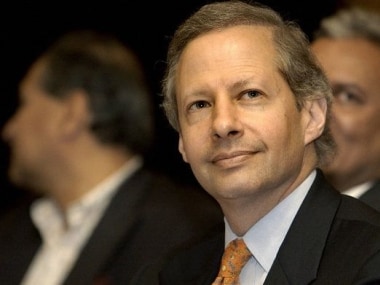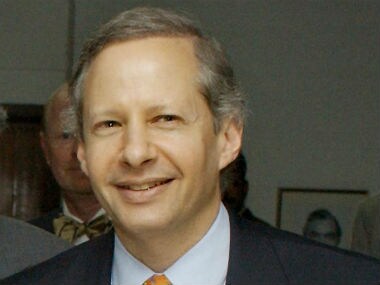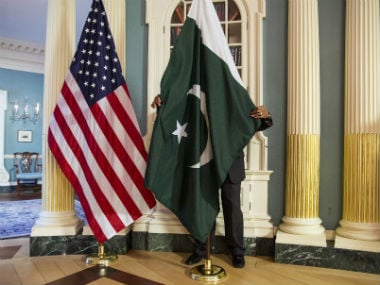Taking the podium for the first time after his elevation as the US Ambassador to India, Kenneth Juster outlined an agenda for India-US ties that he himself described as "ambitious".
Beginning his speech by praising India, Juster went on to recall that President Ram Nath Kovind had called him a "friend of India". He described the early exchanges between the two countries as being strained but marvelled at how far they had come. While concentrating on the diplomatic relations between the two nations, he also said that the best example of the relationship might well be the Indian diaspora in the United States.
He also assured listeners that the US will continue to be a country of immigrants and that the ongoing review of visas, including the H-1B category, was only for "refinements". His comments came in the backdrop of reports that the Donald Trump administration was considering tightening H-1B visa rules that could lead to the deportation of about 750,000 Indians.
The US government, however, has denied these reports. "We have four million Indian-Americans in the US. So we are a country of immigrants and that's what helped drive our economy and growth and made us where we are and that's not going to change," said Juster.
Turning his attention to the Asia-Pacific region, he noted its importance and said that the US in its National Security Strategy had identified India as a "leading power" in the region. He then spoke about the strategic partnership between the two nations and the history of the same. Insisting that the US will remain committed to the region, Juster then laid down the five pillars that he believed could provide the framework for the partnership.

File image of Kenneth Juster. Facebook/AllIndiaRadioNews
Speaking about the defence relationship between the two countries, Juster said that the US wants to work towards the long-term security and stability of the Asia-Pacific region. He said that there are multiple ways to attain this, including military exercises, sale of military hardware and technology, military exchanges, and sharing of information on terrorism networks.
The remarks come in the backdrop of increasing Chinese assertiveness in the region.
He then turned his attention to the second pillar: Economic relations. Noting that while bilateral trade has increased manifold over the years, Juster said that there is still plenty of room to grow. Interestingly, he said that "America First" and "Make in India" are not incompatible. Instead, he said that investing in each other's markets will be mutually beneficial. Here, he also made the only China reference in his speech as he said that many US companies are looking for alternatives to China and India could seize the opportunity to be the hub for US businesses in the region.
Adding that greater India-US trade will lead to increased capital flow and further transfer of intellectual know-how, he even speculated that eventually the two nations could sign a Free Trade Agreement. However he did acknowledge that we are a long way from such a scenario.
Juster's third pillar was that of energy and environment. He pointed out that India's constant growth means that its energy needs are going to be substantial in the near future. He offered US help in all forms of energy including coal, crude oil, nuclear power etc as well as the supporting services and infrastructure necessary to best harness the same.
Pivoting to science and technology, Juster called them the fourth pillar of the relationship and noted collaborations between ISRO and NASA as well as the joint strides in medical innovation.
Finally, Juster spoke about regional cooperation. He spoke specifically about Afghanistan and emphasised the need to eliminate its reputation as a safe haven for terrorists. He also noted that collaborations with other nations like Japan and Australia to nurture multilateral groupings in the region.
While concluding his speech, Juster asked the two nations to approach each other as friends and to treat each other with respect and trust. Noting that terms "true friends" and "natural allies" have been used for the two countries, he asked that they now give substance to the phrases and build a strong and durable partnership.
No reference to Pakistan in speech
While he made no reference to Pakistan in his speech, when he was asked why terror groups active against India were not named while suspension of aid to the country, Juster said, "Pakistan is important too for the situation in Afghanistan."
"Don't think we will get stability in Afghanistan if Pakistan does not positively contribute. That was the major factor behind the suspension as we feel they have not done as much as they could in eliminating terror sanctuaries in Pakistan that are contributing to instability in Afghanistan," he added.
Asked about the US ties with China, he said his country wants to have a constructive relationship with every country in the region. "We want to have a constructive relationship with the Chinese as well. But we also want to make it clear that if they are going to be engaged in certain predatory economic behaviour or other activities than there's an alternative set of principles that other countries of the region are going to follow," he said.
He also added that "we can have more points of convergence than divergence but the only way to try to make that happen is to constructively build something on our part that China sees benefit to be a part of.
Click here for the full text of Kenneth Juster's remarks.
With inputs from agencies
Published Date: Jan 12, 2018 12:18 PM | Updated Date: Jan 12, 2018 12:18 PM















